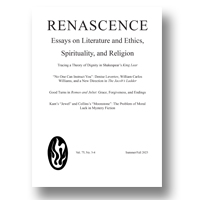|
|
|
1.
|
Renascence:
Volume >
65 >
Issue: 4
John Savoie
Abraham and Oedipus:
Paradigms of Comedic and Tragic Belief
abstract |
view |
rights & permissions
| cited by
As a way to gain insight into the phenomenon of religious faith, this essay classifies the Abraham story as a comedy, and contrasts it with the tragedy of Sophocles’s Oedipus. In keeping with the psychologist William James’s “Will to Believe,” faith is usefully conceived as itself an action, one on which actions in the world are predicated. Analyzed thus, the Abraham story patterns a “Jamesian commitment of the will to determined and determining action in an otherwise uncertain world.” The etymology of Isaac, “laughter,” expresses the principle carrying Abraham through his tribulations; “at the very brink of tragedy, the surrogate ram affirms a comedy that can withstand any predicament. ‘Isaac’ lives.” Oedipus and Jocasta, however, meet tragedy in their effort to disbelieve.
|
|
|
|
|
|
|
2.
|
Renascence:
Volume >
65 >
Issue: 4
Robert Costomoris
Criseyde’s Swoon and the Experience of Love in Troilus and Criseyde
abstract |
view |
rights & permissions
| cited by
Proposing to reconcile the opposing camps of interpretation of Chaucer’s poem, with love’s irrationality condemned on one side and love’s mutuality celebrated on the other, this essay offers a balanced reading of Troilus and Criseyde. The poem’s exemplarity lies not in a systematic application of principles: “we must experience Troilus and Criseyde’s love on its human terms.” Love’s moral complexity is experienced in the passages surrounding the characters’ swooning. Such episodes prove rationality to be as much of a problem as irrationality when it comes to love. Reason is particularly suspect in Criseyde’s response to the couple’s parting.
|
|
|
|
|
|
|
3.
|
Renascence:
Volume >
65 >
Issue: 4
Joshua Avery
Protestant Epistemology and Othello’s Consciousness
abstract |
view |
rights & permissions
| cited by
Factoring in the paradoxical relationship between faith and empiricism in Protestant epistemology, this essay attributes Othello’s disaster to his inability to take the leap of faith a Protestant sensibility demands. Protestantism inherits from Luther a rigid compartmentalization of the knowable and the mysterious. Othello, innately inclined and further conditioned to think in terms of “tangible evidence,” cannot imagine alternative possibilities. His handling of Cassio’s brawl shows how Othello requires that facts speak for themselves, and how he has no access to the “imaginative effort” necessary for charity. Additionally, Iago’s manipulation renders imagination intolerable for Othello, and reinforces his tendency to literalism, doctrinal purity, and a need for certainty.
|
|
|
|
|
|
|
4.
|
Renascence:
Volume >
65 >
Issue: 4
Matthew Sayler
Watching the Detectives:
Discovering Hope in the Jansenist World of The Third Man
abstract |
view |
rights & permissions
| cited by
Considering The Third Man as an “entertainment” with “serious religious and ethical engagement,” this essay suggests the novel’s ultimate discrediting of the despair indicated by the desolate setting, postwar Vienna, and by Jansenist determinism. Two thematically crucial scenes address this despair: the visit to the office of Dr. Winkler, the cynical relic collector; and the interview between the protagonist and the charlatan Harry Lime, who has faked his own death, as they ride on the Great Wheel. “Both Lime’s speech atop the Wheel and Winkler’s dismissal of the relics point the reader to the same interpretive enigma: bodies are nothing more than charnel or they are significant spiritual ‘clues.’” A comparison to the story “A Visit to Morin” shows how The Third Man forces a confrontation with the possibility of grace.
|
|
|
|
|
|
|
5.
|
Renascence:
Volume >
65 >
Issue: 4
Stephen Heiny
Virgil in Seamus Heaney’s Human Chain:
“Images and Symbols of Our Predicament”
abstract |
view |
rights & permissions
| cited by
After reviewing important manifestations of Heaney’s engagement with Classical literature, this essay examines the poet’s appropriation of Book Six of the Aeneid in several poems from the 2010 collection The Human Chain. Allusiveness to Virgil lets Heaney explore death, loss, memory, guilt, and, ultimately, the affirmation of life. Helpful in the analysis is Heaney’s concept of “translation.”
|
|
|
|
|
|
|
6.
|
Renascence:
Volume >
65 >
Issue: 4
Notes on Contributors
view |
rights & permissions
| cited by
|
|
|
|





